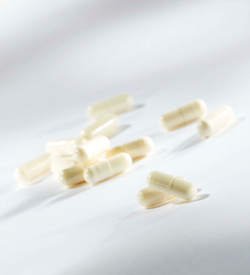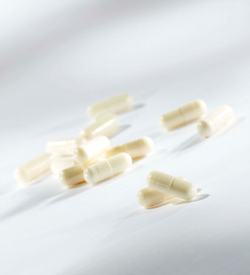Providing Quality & Trust
Cyclosporine Oral Capsule
Wedgewood Pharmacy
$101.50 - $479.00
$101.50 Each
Detailed Description
CYCLOSPORINE: CAPSULE
Prescribed For: Dogs and Cats
May be Prescribed For: Atopic Dermatitis, Inflammatory Bowel Disease and Asthma
Basic Information
Cyclosporine, also called cyclosporin A (CsA), was the first discovered and is the only commercially available drug in the cyclosporin category of immunosuppressive drugs.
Cyclosporine is non-cytotoxic. It inhibits T-helper cell activity and shifts the regulation of the immune response towards immune tolerance. Since T-cells orchestrate most chronic immune responses, cyclosporine has broad anti-inflammatory effects. Its original indication was to prevent rejection in organ transplantation patients; its systemic indications currently include many autoimmune disorders.
The first commercial ophthalmic cyclosporine was Optimmune®, a 0.2% cyclosporine ointment made by Schering Plough Animal Health. Optimmune® was approved in 1995 in the Unites States to treat canine KCS and approved in Europe for KCS and pannus. Compounded ophthalmic cyclosporine drops have been used commonly in 1.0-2.0% concentrations in corn oil when Optimmune® was either commercially unavailable or owners were physically unable to apply an ointment. An aqueous suspension of 0.05% cyclosporine (Restasis®) was developed by Allergan Pharmaceuticals for treatment of KCS in human patients.
Adverse Effects and Precautions
- Suppression of systemic lymphoblastogenesis has been reported in small dogs treated with 2% topical cyclosporine, but not with 0.2% (Optimmune®), suggesting that lower concentrations are advisable, particularly in small animals.
- Ocular irritation reactions, including conjunctival hyperemia, periocular alopecia, and blepharitis are common when topical
- Cyclosporine is made from oral cyclosporine (Sandimmune®) but rarely are seen with Optimmune. Ingredients in the oral solution such as alcohol and surfactants as well as higher concentrations of CsA contribute to the irritation response. Cats have a lower tolerance to this ocular irritation than do dogs.
- Experimentally, CsA-induced exacerbations of ocular herpes in cats occurred when used without concurrent virostatic agents.
- Unlike corticosteroids, cyclosporine does not induce collagenase and is therefore not contraindicated in the presence of corneal ulcers.
- Epiphora is an anticipated side-effect of CsA in non dry-eye patients.
- The bioavailability of CsA is affected by the oil in which it is dissolved. Corn oil and castor oil are desirable vehicles; mineral oil is particularly undesirable. Cyclosporine is an extremely stable molecule, however stability of the ophthalmic preparation is limited by solubility, oxidation of the vehicle and sterility.
Recommended frequency is usually twice daily and can be adjusted more or less frequently to effect. For KCS, ophthalmic cyclosporine usually needs to be continued lifelong. For transient ocular surface disorders it may be used periodically as needed.
Powered by nopCommerce
This site is running in live payment mode. Real payments will be processed.

